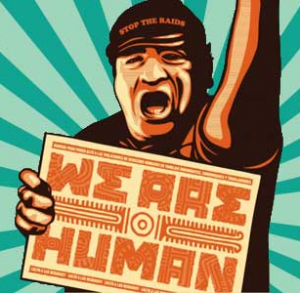A 2011 Retrospective Of Latino Struggles
As 2011 has come to a close, I reflect on the struggles Latinos across the country have endured this past year. This moment of reflection is not a passing one. I wake up every morning thinking about the challenges Latinos face and how to bring solutions to these issues. As a Latino urban planner, I am in the position of assisting, guiding, and organizing future action to bring about change. The challenges Latinos faced in 2011 are not isolated problems.
These issues are systemic, structural, and national problems. Over the past several months, we have seen the following headlines: “Chicago Latino Population Spreads To Suburbs, Presenting New Regional Challenges,” “Half of Latinos in U.S. Live in the Country’s Most Polluted Cities,” “After Ruling, Hispanics Flee an Alabama Town,” “Hispanic Poverty Rate Highest In New Supplemental Census Measure,” and “Study finds Latino workers trapped under ‘blue-collar ceiling.”.
At the core of these headlines are issues of housing affordability, environmental justice, immigration reform, wealth creation, and educational attainment. These are complex place- and people-based challenges. There is no singular policy that can bring about the change Latinos would like to see in their communities. Further, the challenges Latinos face are interlinked. No one problem can be addressed without the consideration, attention, and planning of the other. There is no silver bullet.
The process for change is a strategic combination of measures occurring at the same time. These measures include the use of direct action (e.g. protesting), the political system (e.g. voting), the legal system (e.g. lawsuits), social entrepreneurship (e.g. creating new organizations), partnerships (e.g. leveraging resources among organizations), and negotiation (e.g. mediation-arbitration). The barrier as well as the opportunity for Latinos is being able to harness and effectively engage these systems.
In the midst of such difficult times, how are Latinos to respond? I believe that all Latinos can be leaders. No matter your immigration status, education, income, age, or background, you are an asset to your community. I am tired, as most Latinos, of waiting for external validation. We matter because we have a voice and have the power to act. Additionally, Latinos have a strong network. This is true at the local and national level.
Why not volunteer at Pilsen Environmental Rights and Reform Organization (P.E.R.R.O) or Little Village Environmental Justice Organization (LVEJO)? Or sign up for the National Council of La Raza’s (NCLR) action network to participate in national campaigns? Initiate your own interest group, community organization, or neighborhood block club. Most importantly, everyone can make a difference, can contribute, and be a part of a movement to improve and build their communities. So engage, connect, and let’s ring in the New Year with action. ¡Feliz año nuevo!
[Photo By Shepard Fairey]

